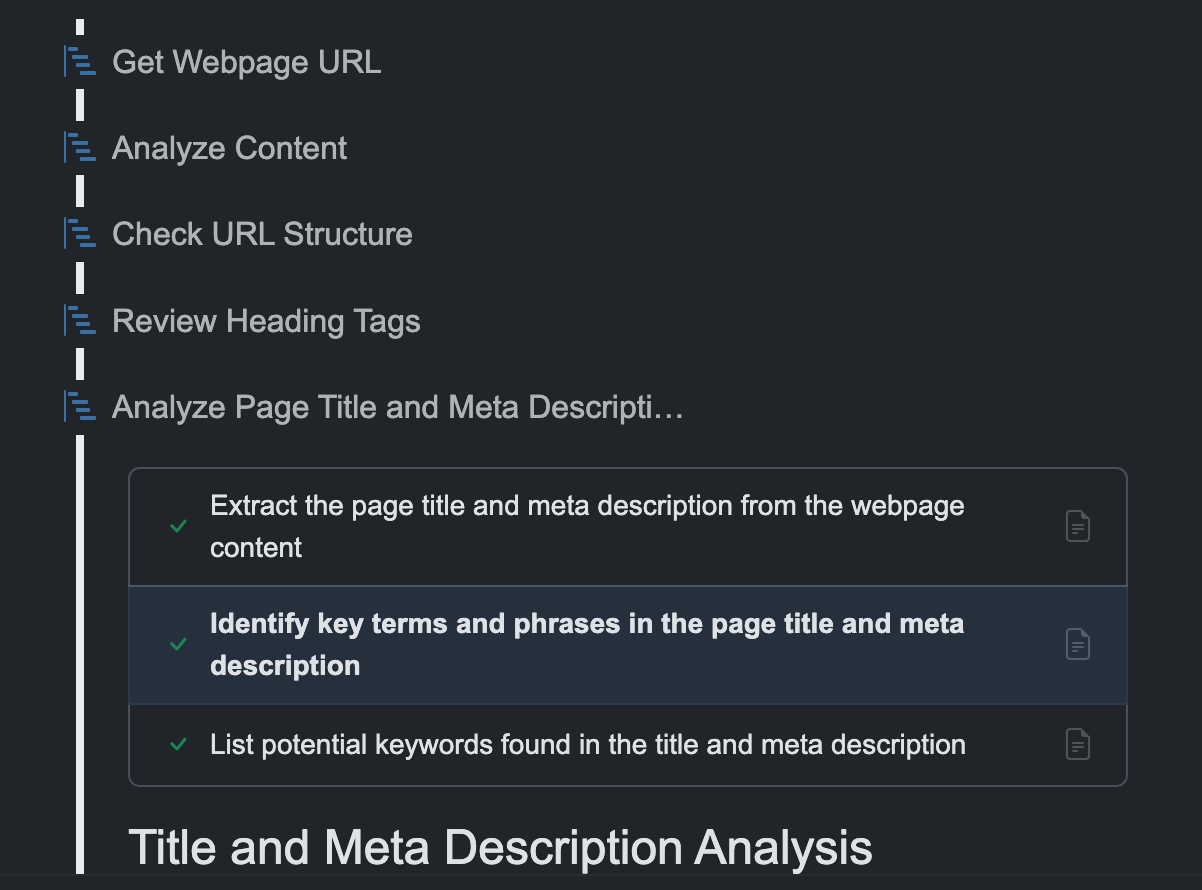Workflow
LLMO/GEO Analysis
Compare how different AI models rank and analyze topics across 16 leading language models simultaneously.

Workflow Overview
This workflow is a bit more involved than the others, but it’s still easy to follow and showcases the incredible control you have over complex, multi-step processes. You’ll run the same prompt across 16 different AI models and automatically compile the results into a comprehensive analysis table.
Important: Before running this workflow, make sure to enable the LLMO/GEO tool in your knowledge base settings.
LLMO/GEO Analysis
Step 1:
Specifically state: "Ask the user for a prompt."
Step 2:
Generate a unique id using the prompt and formatted as snake case and store it in memory in a key called "unique_id_for_run".
Step 3:
Create a file named 'llmo_results_{{unique_id_for_run}}.md' with the following table structure:
| Rank | Name | Mention Count | Associated Keywords | Related Links | Model |
| ---- | ---- | ------------- | ------------------- | ------------- | ----- |
**IMPORTANT** Mention this in the step: YOU **MUST** replace {{unique_id_for_run}} with the value found in memory for "unique_id_for_run".
Step 4 - 20
For each of the following models:
- Claude Sonnet 4
- Claude 3.7 Sonnet
- Claude 3.5 Sonnet V2
- Claude 3.5 Haiku
- DeepSeek-R1
- Meta Llama 3.3 70B
- Google Gemini 2.5 Pro
- Google Gemini 2.5 Flash
- Grok 3
- Grok 3 Mini
- Perplexity Sonar Pro
- Perplexity Sonar
- OpenAI GPT-4.1
- OpenAI GPT-4o
- OpenAI o4-mini
- Amazon Nova Pro
Do the following:
a. Call the LLMO tool with the prompt from Step 1 with the model.
b. Store the entire results from the tool in a file using a name like {{model_name}}_{{unique_id_for_run}}.md'
c. Specifically mention in Step: Add the statistics table (without the header) from the LLMO results as new rows in the 'llmo_results_{{unique_id_for_run}}.md' table.
- Ensure that you add one column, at the end of the row, that includes the model name. Each row **must** contain values (even if blank) for Rank, Name, Mention Count, Associated Keywords, Related Links (where applicable), and Model (**IMPORTANT** do **not** include headers).
- Example content format:
| 1 | Skechers | 1 | Memory Foam Insoles, comfort for all-day wear | | Claude Sonnet 4 |
- Use kb_write_file to append to the end of the file. IMPORTANT: You must use the default model for the steps. The model mentioned here is only for the llmo tool call.
- **IMPORTANT** Mention this in the step: YOU **MUST** replace {{unique_id_for_run}} with the value found in memory for "unique_id_for_run".
Step 21
Display that you have finished the process.Why This Workflow Works
- Comprehensive Model Coverage — Tests your prompt against 16 different AI models to reveal biases and variations in responses
- Automated Data Collection — Eliminates the manual work of running the same prompt across multiple models
- Structured Output — Automatically formats results into a comparative table for easy analysis
- Unique Session Tracking — Each analysis gets its own unique identifier to prevent data mixing
- Detailed Logging — Saves individual model responses for deeper investigation
- Scalable Analysis — Perfect for market research, competitive analysis, or AI model evaluation
Pro Tip: This workflow is perfect for understanding how different AI models interpret the same business question, helping you choose the right model for specific tasks or identify consensus vs. outlier responses.
Run Multi-Model Analysis
See how different AI models interpret the same prompt with ChatterKB’s advanced workflow automation.